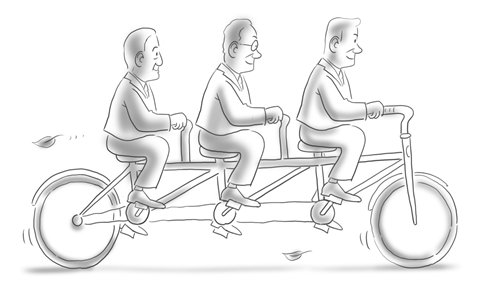Hope on horizon after Li’s Japan visit
Global Times
1526252000000

Illustration: Liu Rui (Global Times)
The 7th China-Japan-South Korea leaders' meeting came at an important juncture in ties between the three countries in Northeast Asia. Chinese Premier Li Keqiang attended the May 9 meeting, which marked a Chinese premier's first visit to Japan since premier Wen Jiabao's trip in 2010.
Bilateral visits of Chinese and Japanese leaders have become less frequent in keeping with tepid ties. As Li said in a signed article in Japanese newspaper Asahi Shimbun, "China and Japan are important neighbors. Although there are dozens of direct flights between Beijing and Tokyo each day and it takes just a little over three hours flying between the two cities, we have walked a long way in recent years to improve and develop China-Japan ties."
Top-level visits are closely related to trust between the countries. In fact, this is not only Chinese premier's first visit to Japan since 2010, but also a South Korean president's first trip to Japan in six-and-half years, and Moon Jae-in's first trip to Japan as president. This shows that Japan's relations with China and South Korea have ebbed since 2012 when Shinzo Abe was re-elected Japanese prime minister.
Japan's attitude started to change since 2017. On the Belt and Road initiative, for instance, Japan has shown its intention to cooperate. China always welcomes a sincere approach to promote regional peace and stability and to improve relations between countries. Li's visit to Japan marks a new opportunity for improving Sino-Japanese relations. In the joint declaration issued after the China-Japan-South Korea leaders' meeting, the first part does not mention, as is usually seen, economic issues or the international situation, but the importance of promoting people-to-people and cultural exchanges. This shows that China's people-oriented diplomacy has won global recognition.
The demand that China-Japan relations should develop on the basis of people-to-people exchanges has been there. Besides, the demand doesn't exclude economic and other factors. The declaration says, "Reaffirming the importance of expanding tourism among our countries, we will continue to strive to reach the goal of 30 million people-to-people exchanges among the three countries by 2020". Except for improving understanding between the two countries' people, it supports the Tourism Nation Promotion Basic Plan in Japan. As it is common for Chinese tourists to travel to Japan, their itinerary has extended from metropolises like Tokyo and Osaka to other regions. This will help Japan's regional development that has long been a concern of the Japanese government. In fact, people-to-people exchanges can bring huge economic benefits.
Traditional economic cooperation between countries influences the economy more directly. China, Japan and South Korea face a common interface of the international economy as US President Donald Trump has been promoting "America First" policy. China as a large economy attracts more attention over its trade dispute with the US. However, Japan is also on the list of countries to be punished by Trump. Japan and South Korea are even more anxious over Trump's anti-globalization agenda as their domestic markets are not as large as China's. This is demonstrated by the commitment to the joint declaration to "building an open world economy."
Japan had boycotted its free trade agreement (FTA) with China and South Korea and the Regional Comprehensive Economic Partnership (RCEP), which it regarded as competitors of the Trans-Pacific Partnership (TPP). However, after the US quit the TPP, Japan began to rethink its policy on the trilateral FTA and the RCEP. Japan's change of heart can be proved by statements in the joint declaration to accelerate the negotiations on the trilateral FTA and the RCEP. However, the US has the reins of Japan's and South Korea's security. If the two countries have to choose between security and economy on any day, it is difficult to tell whether they still stick to their current positions.
The security algorithm in Northeast Asia today has welcomed the changing situation. The easing tensions over North Korean nuclear issue may provide an opportunity for South Korea and Japan to reduce their security dependence on the US.
North Korean leader Kim Jong-un has met with his South Korean counterpart and visited China twice to meet President Xi Jinping. Abe is the only one among the three countries' leaders who hasn't met Kim. Besides, the Kim-Trump summit is set to be held in June. The Six-Party Talks, in which Japan used to exert its influence on the North Korea issue, have been replaced by a new system. Japan has obviously recognized this, as it didn't publicly demand restarting the Six-Party Talks. Instead, it hopes to expand cooperation with China and South Korea, which is a sensible move.
Premier Li's visit to Japan and the joint declaration signal that Northeast Asian countries' relations start improving. Only by strictly implementing the joint declaration can the goal of "building a regional platform for peace and cooperation in this region" be achieved.


